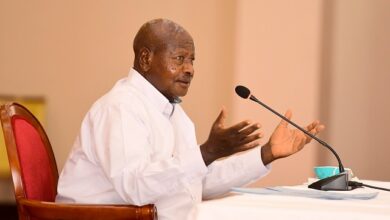Why some Bamasaba are afraid of a strong Cultural Institution
This comparison suggests that those paid to oppose the cultural institution may be driven by self-interest, and without funding or support, their influence will be limited.

Mbale: There are various reasons why some Bamasaba individuals may be fearful or resistant to the cultural institution, as observed in the context of the Bamasaba community.
A relevant comparison is drawn from Rwanda, where President General Habyarimana, when asked about why some Batutsi were fleeing the country, speculated that they were afraid of the prevailing peace.
This raises the paradox of fearing peace itself, which can be applied to the Bamasaba, as those opposed to the cultural institution may be resisting the unity it represents likely because they don’t identify with the institution or its leadership.
A small group of self-appointed “state mercenaries” are described as actively undermining the leadership of the Bukuka, particularly on platforms like WhatsApp. These individuals are said to have negative intentions, but their efforts are ultimately fruitless.
The author compares these individuals to mercenaries, citing a passage from the book The Making of a Modern Mercenary, where a mercenary expresses frustration at being greeted with peace, as he thrives on conflict.
This comparison suggests that those paid to oppose the cultural institution may be driven by self-interest, and without funding or support, their influence will be limited.
According to research cited in the article, about 90% of the Bamasaba community supports the cultural institution. This shows that while a few disgruntled individuals oppose it, they are the minority, and their efforts to undermine the leadership of the Bukuka have had little impact.
Many of those who oppose the institution do so out of fear that it may diminish their own political influence or fame. Some groups have tried various methods to weaken the leadership, but their attempts have been unsuccessful.
The article also highlights the legal framework that protects the cultural institution. Uganda’s Constitution and the Cultural Leaders Act of 2011 discourage the institution and its leaders from coercing individuals into supporting it.
The Bamasaba cultural institution operates within the boundaries of these laws and has never attempted to force allegiance or financial support from the community. Research shows that the majority of Bamasaba see the cultural institution as a central, neutral voice, which brings unity to the community.
The cultural institution is seen as an embodiment of the people’s customs and culture, bringing together all members of the community, regardless of political, religious, or socio-economic background.
The article argues that it is wrong for any Bamasaba to fight against this institution, as it promotes unity and development. Those who continue to undermine the leadership may face challenges, especially as the 2026 General Elections approach, where public opinion will be a significant factor.
Politicians have been seen getting closer to the cultural institution, recognizing the consequences of staying distant from it, especially during election periods. The Bamasaba cultural institution is recognized both as a statutory and cultural organization, and it plays a critical role in upholding the traditions and unity of the community.
The institution is seen as a key player in driving the development agenda of the Bamasaba, with the cultural leader being a symbol of unity.
The article advises the cultural leader to focus on the serious tasks at hand, not getting distracted by petty issues or personal conflicts. It warns against the behavior of individuals who, like the Khawutsasi (a small insect that is intimidated by anything larger than itself), run away from challenges rather than facing them.
The author calls on the Bamasaba community to unite and support the cultural institution as a means to solve the challenges facing the people and to strengthen their collective identity.
The call to action is clear: the Bamasaba must work together to ensure the success of their cultural institution and move forward with unity. The cultural leader, Umukuka III His Highness Jude Mike Mudoma, is quoted as saying that he is committed to unity and will always work towards a peaceful and unified community, with no agenda of retribution.
The author is Steven Masiga, Spokesperson for Bamasaba Cultural Institution.
Disclaimer: As UG Reports Media LTD, we welcome any opinion from anyone if it’s constructive for the development of Uganda. All the expressions and opinions in this write-up are not those of UG Reports Media Ltd. but of the author of the article.
Would you like to share your opinion with us? Please send it to this email: theugreports@gmail.com.






